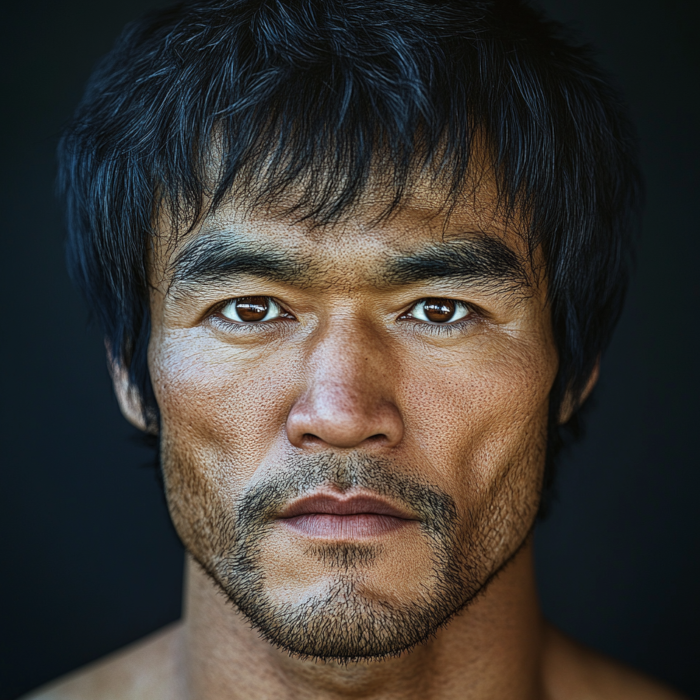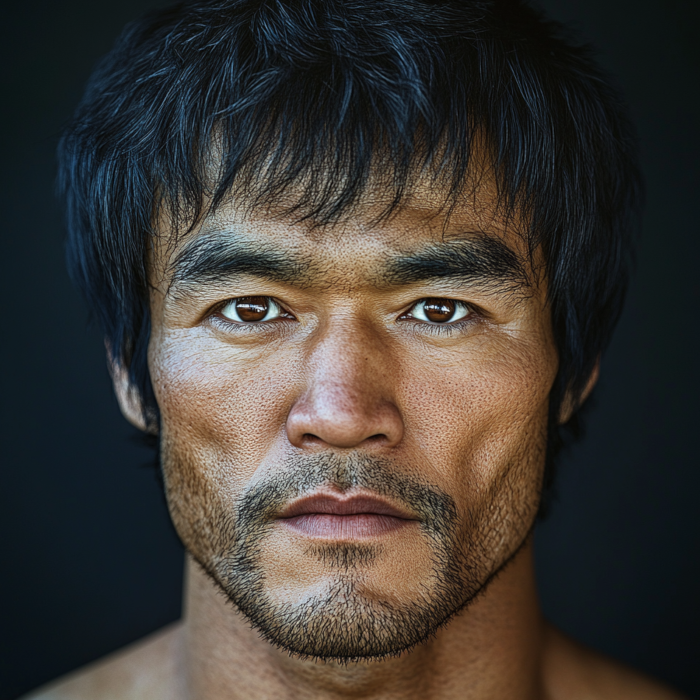


Bruce Lee (1940–1973) was a legendary martial artist, actor, filmmaker, and philosopher who is widely regarded as one of the most influential martial artists of all time and a pop culture icon. Lee is credited with popularizing martial arts in the West and revolutionizing the way martial arts are portrayed in films. His philosophy of martial arts, his groundbreaking films, and his impact on both cinema and martial arts have left an enduring legacy.
Birth: Bruce Lee was born as Lee Jun-fan on November 27, 1940, in San Francisco, California, while his parents were on tour with the Chinese opera. His father, Lee Hoi-chuen, was a famous Cantonese opera star, and his mother, Grace Ho, came from a prominent Hong Kong family.
Childhood in Hong Kong: Shortly after his birth, Lee's family returned to Hong Kong, where he grew up. From a young age, Lee was exposed to the world of entertainment through his father's work, and he appeared in several films as a child actor.
Martial Arts Training: Lee began learning martial arts at a young age, initially training in Wing Chun under the legendary Ip Man. He also studied other martial arts styles and was known for his exceptional athleticism, speed, and dedication to training.
Return to the U.S.: At the age of 18, Lee returned to the United States to further his education. He attended the University of Washington in Seattle, where he studied philosophy. During this time, he began teaching martial arts and developed his own approach, blending various styles and emphasizing practicality and efficiency.
Teaching Martial Arts: Lee opened his first martial arts school, the Jun Fan Gung Fu Institute, in Seattle. He later established schools in Oakland and Los Angeles. His approach to martial arts was revolutionary; he taught a philosophy he called Jeet Kune Do (The Way of the Intercepting Fist), which focused on fluidity, adaptability, and directness in combat.
Early Acting Roles: Lee’s acting career began in Hong Kong as a child actor. After moving to the U.S., he appeared in several television series, including The Green Hornet (1966–1967), where he played Kato, the sidekick of the title character. Although the show was short-lived, Lee's performance gained him recognition for his martial arts prowess.
Return to Hong Kong: Frustrated with the limited roles available to him in Hollywood, Lee returned to Hong Kong in the early 1970s. There, he became a major star, starring in a series of martial arts films that would cement his status as a global icon.
The Big Boss (1971): Lee’s first major film, The Big Boss (released in the U.S. as Fists of Fury), was a huge success in Asia and introduced his dynamic screen presence and martial arts skills to a wider audience.
Fist of Fury (1972): His next film, Fist of Fury (released in the U.S. as The Chinese Connection), was another box-office hit. The film's themes of anti-colonialism and revenge resonated with audiences, and Lee's performance solidified his status as a leading action star.
Way of the Dragon (1972): Way of the Dragon (released in the U.S. as Return of the Dragon) marked Lee’s debut as a director, writer, and star. The film is famous for its climactic fight scene between Lee and American martial artist Chuck Norris in the Colosseum in Rome. This film further showcased Lee’s vision for martial arts choreography and his philosophy of combat.
Enter the Dragon (1973): Enter the Dragon was Lee’s first major Hollywood production and is considered one of the greatest martial arts films of all time. Released posthumously, the film was a massive international success and brought Lee to global stardom. It is often credited with sparking the worldwide interest in martial arts that followed.
Jeet Kune Do: Bruce Lee’s philosophy of martial arts, Jeet Kune Do, is a key part of his legacy. He described it not as a style but as a way of life—a concept of fluidity and adaptability in combat. Lee emphasized that martial arts should be free from rigid traditions and instead be adaptable to the individual and the situation. He advocated for using whatever techniques were effective, regardless of their origin.
Philosophical Influences: Lee was deeply influenced by both Eastern and Western philosophy, including the teachings of Taoism, Buddhism, and existentialism. His writings and thoughts on martial arts, personal development, and life are collected in the book The Tao of Jeet Kune Do, which was published posthumously.
Innovative Training Methods: Lee was ahead of his time in his approach to physical fitness and training. He incorporated weight training, cardiovascular exercise, and flexibility routines into his regimen, which was uncommon for martial artists at the time. His holistic approach to fitness and combat continues to influence martial artists and athletes today.
Untimely Death: Bruce Lee died suddenly on July 20, 1973, at the age of 32, in Hong Kong. The official cause of death was cerebral edema, which may have been triggered by a reaction to a pain medication. His death was met with shock and mourning worldwide, as he was at the peak of his career and influence.
Enduring Influence: Bruce Lee’s legacy has endured for decades, and he remains a cultural icon, especially in the realms of martial arts, cinema, and popular culture. His life and work inspired countless individuals to pursue martial arts and contributed to the global spread of martial arts practice. He is often credited with helping to change Western perceptions of Asian cultures and for breaking racial barriers in Hollywood.
Cultural Icon: Bruce Lee is celebrated not only for his martial arts skills but also for his philosophy, his contributions to film, and his role as a bridge between Eastern and Western cultures. His image and quotes continue to appear in popular culture, and he is often cited as an influence by athletes, filmmakers, and philosophers alike.
Biopics and Documentaries: Numerous documentaries and biopics have been made about Bruce Lee's life, including Dragon: The Bruce Lee Story (1993) and the documentary I Am Bruce Lee (2012). His life story has been the subject of countless books, articles, and discussions.
Statues and Memorials: Statues of Bruce Lee have been erected in various locations around the world, including Hong Kong and Los Angeles, as a testament to his enduring legacy and influence.
Bruce Lee's impact on martial arts, film, and global culture is immeasurable. He broke down barriers, challenged stereotypes, and inspired millions to pursue excellence in their own lives. His philosophy of personal growth, his innovative approach to martial arts, and his iconic status in cinema ensure that his legacy will continue to resonate for generations to come.

We use cookies
We use cookies and other tracking technologies to improve your browsing experience on our website, to show you personalized content and targeted ads, to analyze our website traffic, and to understand where our visitors are coming from. Privacy Policy.